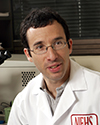Innate Immune Response
-

-
Michael B. Fessler, M.D.
Chief, Clinical Research Branch;
Clinical Director and Chair - Clinical Advisory Committee (CAC);
Principal Investigator -
Tel 984-287-4081
[email protected] -
P.O. Box 12233Mail Drop D2-01Durham, NC 27709
Research Summary
Michael B. Fessler, M.D., is Chief of the Clinical Research Branch, Clinical Director and Chair of the Clinical Advisory Committee (CAC), Chief of the Immunity, Inflammation, and Disease Laboratory, and heads the Clinical Investigation of Host Defense Group. His group investigates the role of cholesterol in innate immunity, and uses proteomic and translational approaches to discover and validate novel insights into the innate immune response.
The group uses genetically modified mouse models and signal transduction approaches to define how trafficking and metabolism of cholesterol regulate the innate immune response, with a particular focus on inflammatory and infectious diseases of the lung. In a related focus area, the group investigates how environmental damage to the host cell, including nuclear and mitochondrial DNA damage and other insults, elicits the innate immune response and inflammatory disease even in non-infectious settings.
Clinical Research
The Fessler laboratory conducts clinical research through the NIEHS Clinical Research Unit under several NIEHS IRB protocols. Peripheral blood leukocytes are collected from volunteers – including those with select genetic polymorphisms or with specific diseases – for investigation of innate immune cell signaling responses. In addition, epidemiologic investigations are conducted, including of national survey data (NHANES) and collaborative clinical patient cohorts, in an aim to define the role of cholesterol and select polymorphisms in environmental diseases.
Major areas of research:
- Roles of lipid raft remodeling in induction and regulation of the innate immune response
- Role of cholesterol trafficking in pulmonary innate immunity
- Roles of cell damage response and the master regulator p53 in innate immune responses to the environment
Current projects:
- Using genetically modified mice to identify regulatory roles for trafficking and metabolism of cholesterol in the innate immune response in leukocytes and in the lung.
- Defining roles for cholesterol and lipid raft proteins in TCR signaling and T cell function.
- Testing the association of select polymorphisms in innate immune genes with functional innate immune responses in leukocytes collected from human volunteers.
Fessler received a B.A. in philosophy from Princeton University in 1992, a medical degree from Harvard Medical School in 1996 and training in Internal Medicine at Massachusetts General Hospital from 1996-1999 and in Pulmonary/Critical Care Medicine at the University of Colorado from 1999-2002. Fessler developed an expertise in basic and translational approaches to the study of innate immunity, which he expanded during four years of a faculty position at the University of Colorado, before joining the NIEHS in 2006.
Relevance to NIEHS Mission
The innate immune response is now known to regulate not only host defense against infection, but virtually all categories of environmentally induced disease. The research program of the Clinical Investigation in Host Defense Group, which uses in vivo models of pulmonary exposure complemented by ex vivo cell signaling studies, aims to define fundamental mechanisms of environmental disease, and to translate these findings to humans.


